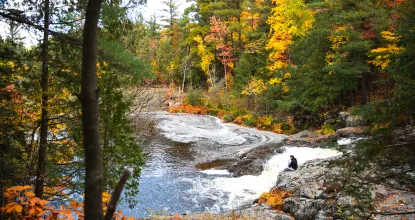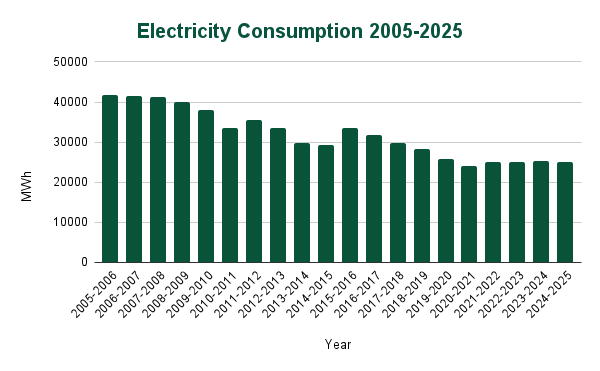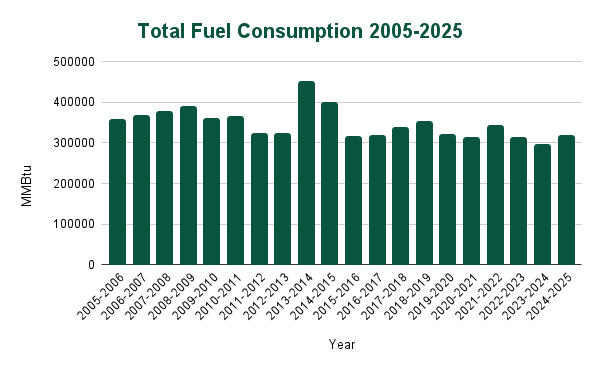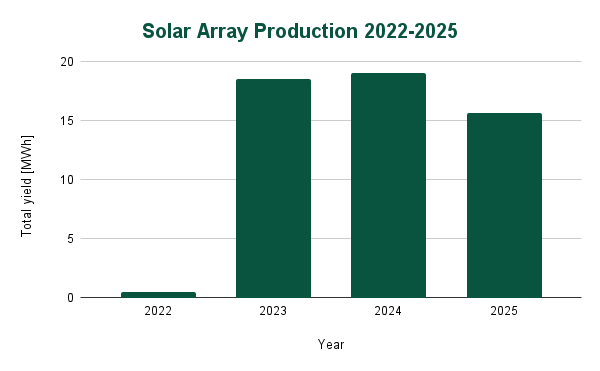Northern Michigan University Sustainability Dashboard
Northern Michigan University’s Sustainability Dashboard is a tool to promote transparency and measure the university’s progress over time. The data in this dashboard is contextualized by the strategies outlined in Northern Michigan University’s Our Compass Strategy 1.4 Action Plan.
Sustainable actions are commonly defined as those that meet the needs of the present without compromising the ability of future generations to meet their own needs. Most definitions of sustainability emphasize the intersection of environmental protection, economic development, and social equity.
Explore this page to see Northern Michigan University's sustainability progress and learn how Northern is working to become a leader in institutional environmental sustainability!
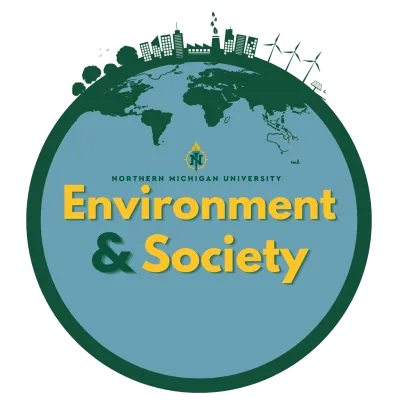
New Gen Ed Pathway: Environment & Society
Northern Michigan University is proud to unveil a new General Education Pathway: Environment & Society! A General Education Pathway is an opportunity to complete the general education requirements while earning an extra credential without any additional courses. The focus of the Environment & Society Pathway is to enable students to cultivate a foundation in recognizing the interconnectedness and interdependence of social, economic, and environmental systems. With this recognition of local, regional, and global problems, students can evaluate roles, values, and agency to support meaningful change.
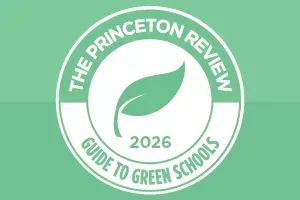
The Princeton Review Guide to Green Colleges 2026
The Princeton Review Guide to Green Colleges- 2026 Edition was created based on a 25-question survey that gathered information about each institution's sustainability-related policies, practices, and programs. Students were also surveyed about their experience at the school, including administrator and student support for environmental awareness and conservation efforts on the campus.
The collected data was analyzed to tally Green Rating scores for the institutions as a measure of the school's performance as an environmentally aware and prepared institution, reported on a scale of 60 to 99. Read more about the process here.
Northern Michigan University is proud to be featured in the Princeton Review Guide to Green Colleges 2026 with a score of 90/99!
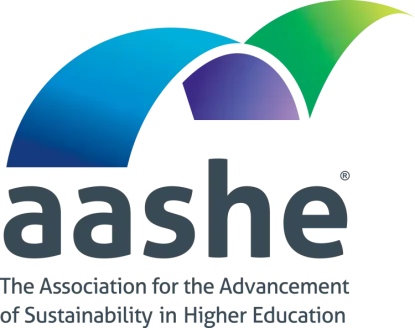
Sustainable Campus Index
The Sustainable Campus Index (SCI) is an annual report produced by the Association for the Advancement of Sustainability in Higher Education (AASHE) that recognizes universities excelling in various aspects of sustainability. Recognition is based on data reported by hundreds of institutions each year through the Sustainability Tracking, Assessment and Ranking System (STARS).
Northern Michigan University is proud to be featured in the Sustainable Campus Index for our commitment to divestment from fossil fuels, progress made toward carbon neutrality, and support of sustainable initiatives on campus.
Explore the 2025 Sustainable Campus Index to learn more!
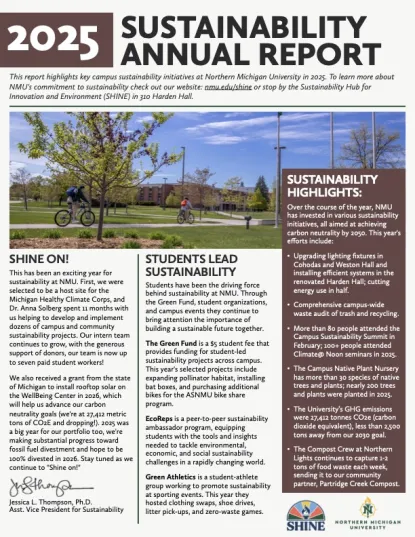
Sustainability Annual Report
Each year, SHINE produces a report highlighting the progress made toward meeting Northern Michigan University's sustainability goals as outlined in Our Compass and as guided by our core values of community, opportunity, rigor, environment, inclusion, connections, innovation, and wellbeing.
In the 2025 Annual Report, you can learn more about student-led sustainability initiatives, the growth and progress of the sustainability demonstration area, the campus waste audit, and divestment progress.
Explore our 2024 Annual Report to learn about the many sustainability initiatives accomplished last year!
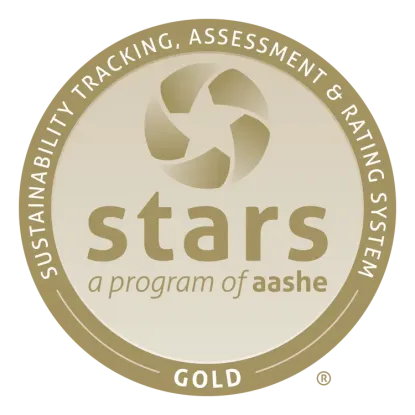
STARS Rating
The Sustainability Hub for Innovation and Environment (SHINE) reports the metrics in this dashboard to the Sustainability Tracking, Assessment & Rating System (STARS), a self-reporting framework for colleges and universities to measure sustainability performance.
In 2024, Northern Michigan University was awarded a STARS Gold rating for the first time!
An institution’s STARS score is based on the percentage of applicable points earned in credits across four main categories: Academics, Engagement, Operations, and Planning & Administration. Information from these categories is displayed in this dashboard to make it more accessible.
Academic Programs and Research
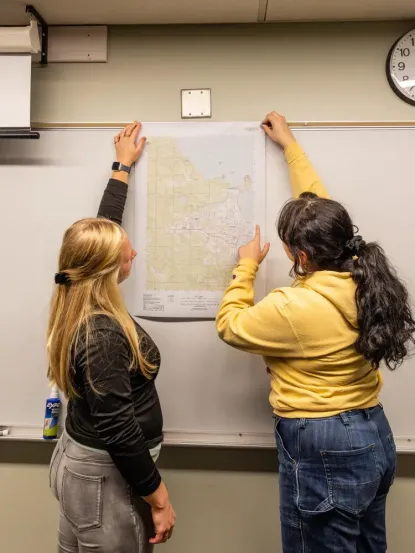
Academics
NMU offers a variety of academic programs that include elements of sustainability education as part of the core curriculum.
Sustainability course offerings, 2025:

Environmental Studies and Sustainability Major
The Environmental Studies and Sustainability Major at Northern Michigan University provides an introduction to quantitative and qualitative methods of assessing and analyzing humankind’s impact on the environment.
Undergraduate Bulletin Description
Environmental Science Major
The Environmental Science Major at Northern Michigan University provides students with an interdisciplinary approach to applying research methods, assessment techniques, and management strategies to resolve environmental problems. It provides students an opportunity to gain an understanding of how the physical, biological, and social sciences interact with each other in this field of study.
Undergraduate Bulletin Description
Sustainable Business and Enterprise Creation Major
The Sustainable Business and Enterprise Creation Major combines three important areas of education to prepare students for careers in socially responsible enterprises. Sustainable and Enterprise Creation is a way of doing business that makes profits through means that reduce harm to society and the environment. It turns challenges into business opportunities that serve a triple bottom line of profits, society, and the environment.
Undergraduate Bulletin Description
Sustainability Minor
The Sustainability Minor at Northern Michigan University provides students with a geographic approach to understanding sustainability challenges.
Undergraduate Bulletin Description
Environmental Studies Minor
The Environmental Studies Minor at Northern Michigan University provides students with an introduction to environmental studies and sustainability challenges.
Undergraduate Bulletin Description
Earth, Environmental, and Geographical Sciences Cluster Minor
The Earth, Environmental, and Geographical Sciences Cluster Minor at Northern Michigan University provides students with an opportunity to design a program related to the physical or cultural dimensions of environmental or geographical sciences.
Undergraduate Bulletin Description
Food, Environment, and Society Minor
The Food, Environment, and Society minor allows students to study food and the environment from an interdisciplinary perspective. The program is focused on sustainability and consists of courses analyzing the current food system across multiple disciplines.
Undergraduate Bulletin Description
Administration of Outdoor Recreation and Nature-Based Tourism
The Administration of Outdoor Recreation and Nature-Based Tourism degree is designed to create leaders in the field of Outdoor Recreation and Nature-based Tourism. Graduates of this degree will qualify for advancement in current careers or administrative positions in Outdoor Recreation, Recreation, and Private industries.
English MA - Literature and the Environment Concentration
Our newest addition to the English MA program, the Literature and the Environment concentration includes courses in ecocriticism, environmental literature, and nature writing (many of which include outdoor experiences)--as well as courses in fields other than English, such as Business; Communication and Media Studies; Earth, Environmental, and Geographical Sciences; and Native American Studies. If you're interested in merging your love for literature with your concern for the environment--or in pursuing a "green career" in environmental communication, advocacy, or education--this could be the right concentration for you!
Master of Science in Sustainability
The Master of Science in Sustainability program is designed for recent graduates, current professionals, and practitioners who wish to contribute meaningfully to work in sustainability. Students in the program choose to complete a practicum or a thesis. They will receive training in methodologies relevant to the social and natural sciences, develop their proficiency in the use of geospatial analysis tools, and hone skills relevant to policy implementation and organizational leadership.
Campaigns and Community Partnerships
Northern Climate Network
NMU hosts the Northern Climate Network - provides meeting space and refreshments and supports faculty participation. This partnership is ongoing. It was initiated in 2014 with three founding community partners and has continued with collaborative programming, policy guidance, and community engagement with local sustainability issues of climate resilience, and public health in an era of climate change.
Zero Waste Challenge
The Zero Waste Challenge is an initiative held at a sporting event where students, staff, and community members help divert waste from the landfill. Volunteers discussed how/what to recycle and compost with 4,200+ participants attending the hockey game. The volunteers helped to divert 75% of the concession and event waste from the landfill.
Dead River Community Forest Project
NMU's SHINE partnered with the U.P. Land Conservancy to provide students with experiential learning opportunities and field-based research in a way that also advances the Dead River Community Forest Project. During the 2022 "Day of Giving" the NMU Foundation partnered with the UP Land Conservancy to raise money to support collaborative projects at the Dead River Community Forest.
Climate Adaptation Task Force
The Climate Adaptation Task Force (CATF) is a partnership between Marquette County, the Superior Watershed Partnership (SWP), and Northern Michigan University (NMU). Other partners include the Community Foundation of Marquette County and city and county elected officials. The task force has considered the various aspects of sustainability as it relates to climate change, such as robustness, efficiency, and cost-effectiveness of electricity generation in Michigan's Upper Peninsula; assisted local governments and businesses in identifying and prioritizing problems related to climate change in their communities; measured how climate change affects lake levels, aquifers, and other aspects of the local environment; and raised public awareness of how local communities and businesses can take proactive action in response to extreme weather events and other consequences of climate change.
Good for U.P.
In the first year of the campaign (2021), 9 businesses worked with students to pursue B Corp status, and in August 2022 another 5 businesses participated. Because of the usefulness and impressiveness of the student's projects, a private donor gave $10,000 in September 2022 to fund student internships to continue B Corp and sustainability audit projects with local businesses. In Fall 2023, 30 students worked with 8 businesses; 6 students continued in internships with those businesses and we received an additional $10,000 in funding from an anonymous donor to continue those projects.

Operations
Northern Michigan University works to implement sustainability initiatives in its operations to reduce its impact on the environment. These initiatives can be found in Northern's buildings and grounds management, water use, energy use, dining practices, procurement, waste, and transportation. Northern Michigan University measures its performance in these categories to assess its progress toward sustainability.

Buildings & Grounds
72.84% of newly constructed or renovated building space is certified under a green building rating system for design and construction (LEED).
Northern Michigan University’s physical campus is made up of more than 50 facilities.
LEED Silver Halls at NMU: Van Antwerp Hall, Hunt Hall, The Woods (Birch Hall, Cedar Hall, Maple Hall)
LEED Certified Halls at NMU: John X. Jamrich Hall, Meyland Hall, Magers Hall, Magers-Meyland Lobby, Hunt-Van Antwerp Lobby

Campus Area
Northern Michigan University's total campus area is 357 acres, including 152 acres of impervious surfaces.
Managed Grounds by Method:
Area (acres) | |
|---|---|
Area managed organically, without the use of inorganic fertilizers and chemical pesticides, fungicides and herbicides | 98.10 |
Area managed in accordance with an Integrated Pest Management (IPM) program that uses selected chemicals only when needed | 0 |
Area managed using conventional, chemical-based landscape management practices | 105.72 |
Total area of managed grounds | 203.82 |

Biodiversity
1,144 trees were surveyed on Nothern Michigan University's main campus and outlining areas. 7 endangered Ash trees were documented on campus.
The Gray Wolf, Northern Long-eared Bat, Red Knot, Kirtland’s Warbler, Tricolored Bat, and Monarch Butterfly are all endangered and vulnerable species with habitats on land owned or managed by Northern Michigan University.
Northern maintains No Mow Zones, a clover lawn, a rain garden, a research apiary, and an Outdoor Learning Area to protect native plant species and pollinators like the Monarch Butterfly. These activities promote biodiversity on campus and several are funded by the Green Fund.
The NMU Grounds department recycles all used oils and antifreeze from campus vehicles and equipment, composts all landscaping waste products, prohibits the use of restricted-use pesticides on campus, and attempts to use primarily native species plantings.
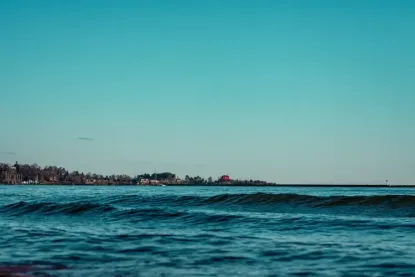
Water
There was a 5.51% reduction in potable water use per weighted campus user between 2010-2011 and 2021-2022.
There was a 37.57% reduction in potable water use per unit of floor area between 2010-2011 and 2021-2022.
There was a 36.17% reduction in total water withdrawal per unit of vegetated grounds between 2010-2011 and 2021-2022.
Hunt and Van Antwerp Halls are equipped with Sloan's Dual-Flush valve toilets which reduce water volume by 30%.

Energy & Climate
In Fall 2022, Northern Michigan University installed a bi-facial solar panel array that captures light from both sides, increasing year-round efficiency by up to 20%. In 2023, this 15,000-watt (30 panels) solar array produced 17,633 kW of electricity.
The University also produces electricity on-site through cogeneration at the Ripley Heating Plant, where waste heat is used to energize the turbine that produces electricity for the campus.
NMU is planning to become Carbon Neutral by 2050. See our progress as we Decarbonize Campus.
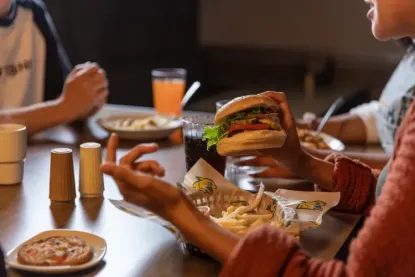
Food & Dining
Northern Michigan University partners with BSB Farms, Dancing Crane Coffees, Jilbert Dairy, NMU Hoop House, Partridge Creek Farm, Superior Culture, Superior Home Farm, Thill's Fish House, U.P. Food Exchange, Keweenaw Brewing Company, Blackrocks, Fresh Wind Farms, and Vollwerth’s to provide students with a diverse and well-balanced dining experience.

On-Campus Partners
NMU Dining partners with the Hoop House (NMU’s solar greenhouse) by purchasing all the produce they grow that isn’t utilized elsewhere. NMU Dining also partners with the Indoor Agriculture program to purchase all the produce their storage container garden grows.

Local Farms
NMU Dining diverts almost all of its pre-consumer compostable waste by partnering with a local farm, Partridge Creek Farm. Partridge Creek Farm has a network of gardens in Ishpeming, MI that grow and distribute fresh produce to its community. NMU Dining also works with the Upper Peninsula Food Exchange to purchase food from local farms.

Sundre
Sundre Snack and Supply Co. offers non-GMO, USDA Organic, recycled, fair-trade certified, local, green-packaged, all-natural, clean label, kosher, vegan, and vegetarian products. Many products are sourced locally within the state of Michigan. Sundre also has a unique line of glass jar salads that are healthy, vegan, vegetarian, and gluten-free dining options. The program also allows the glass jars to be returned for a deposit so that they can be reused.

Vegan Stations
In the dining hall, Parsnip offers a hot breakfast, lunch, and dinner vegan option every day. There are additional vegan options in the dining hall at 16 Greens (the salad bar) and Robin's Nook (the allergen-friendly room). NMU Dining also offers several vegan options on every retail outlet menu and grab-and-go options are available at the convenience stores.
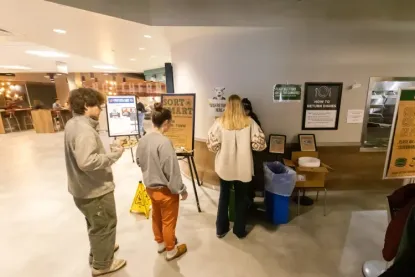
Waste Prevention
About 200 lbs of waste is diverted from the landfill every time the Compost Crew works in Northern Lights Dining. NMU is exploring ways to scale and extend this effort.
Northern stopped using trays in the dining hall and adjusted portion control to reduce food waste.
NMU Dining collects and donates food to the Warming Center that would otherwise go to compost or trash.
NMU Dining partners with Sanimax to remove and recycle oil used during food preparation.
Northern uses biodegradable paper plates, recycled napkins, cornware utensils, and Pepsi’s compostable cups.
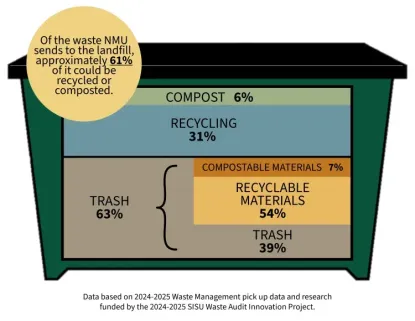
Waste
NMU’s Single Sort recycling program started in the Residence Halls in 2007 and has since been implemented campus-wide.
Each residence hall room, classroom, and faculty office is equipped with a recycling bin to encourage the recycling of everyday products.
Northern Michigan University offers hazardous waste and electronic waste disposal via work order.
Battery collection tubes are located around campus and in the dorm buildings.
92% of construction and demolition materials were diverted from the landfill or incinerator through recycling, donation, or other forms of recovery in 2023.
All waste oil and antifreeze from the university's 59-vehicle fleet and all grounds equipment are collected and recycled.
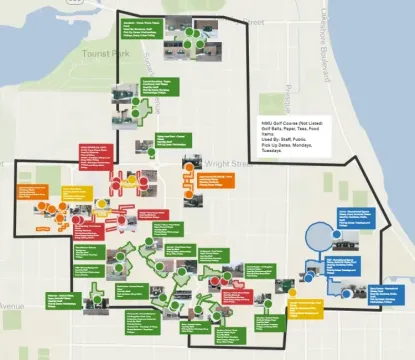
Waste
Students performed a waste audit of NMU’s dumpsters and created an interactive map detailing the location, users, pick-up dates, and type of waste for every dumpster on campus.
Find out more about the Spring 2025 Waste Audit and how we can make improvements to waste diversion on campus.
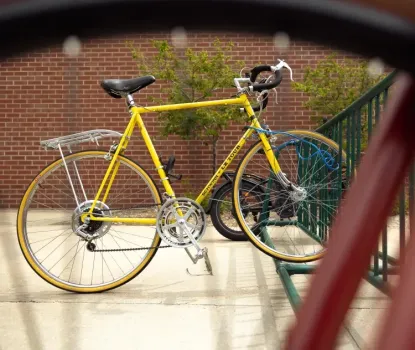
Transportation
NMU students can register their bike with Campus Safety for free for assistance if it is lost or stolen. Students living in residence halls and on-campus apartments can store their bikes in a clean, dry, and secure place during the winter months for free. Seasonal and year-round bike racks are available around campus.
NMU has a free bike rental (fat tire) located in the Fit Zone and the Outdoor Rec Area. Any NMU student can rent for free with their ID. Learn more here.
NMU has a Level 2 charging station with a J1772 Port located at the Northern Center in Parking Lot 8.
The Wildcat Shuttle offers students free transportation to the local shopping stores.
NMU faculty, staff, and students can ride the MarqTran bus system county-wide for free with an NMU ID.

In October 2022, Northern's Sustainability Advisory Council administered a survey on the transportation habits of students, staff, and faculty at Northern Michigan University. A total of 1,312 people responded to the survey, which was a representative sample of the total student and employee population at Northern Michigan University. The survey asked respondents what types of transportation they primarily use to get to and from campus.
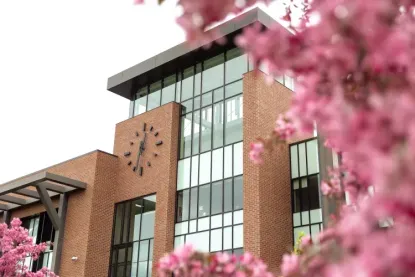
Planning
Sustainability planning allows Northern Michigan University to refine its vision of a sustainable future and helps to create initiatives that promote that vision.
This section details some of Northern's activities and accomplishments that advance sustainability at the University.

Carbon Neutrality Plan
The Carbon Neutrality Plan was adopted in December 2023 with the goal of achieving carbon neutrality by 2050.
NMU is researching the different state and federal funding opportunities for renewable energy. The Carbon Neutrality Task Force was activated to develop a procedure for carbon neutrality oversight and measurement of the University’s carbon footprint, as well as creating projects to achieve NMU's yearly targets.

Okanagan Charter
In April 2023, Northern Michigan University was the 17th university in the United States to adopt the Okanagan Charter. Read the Charter here.
The Charter has two calls to action: Embed health into all aspects of campus culture, across the administration, operations, and academic mandates; and lead health promotion action and collaboration locally and globally.
Adopting the Okanagan Charter has led NMU to direct increased focus toward Wellbeing, Diversity & Inclusion, and Sustainability.

Investment
On December 15th, 2023, after a two-year-long campaign by DivestNMU, the Northern Michigan University Board of Trustees voted unanimously to divest NMU's investments from the fossil fuel industry.
Northern Michigan University has made a goal to increase sustainable investments by 15%. Currently, fossil fuel funds account for approximately 5% of NMU’s total investment portfolio. NMU will divest 100% from direct or indirect ownership in companies involved in fossil fuels by 2028, and aim for 97.5% divestment by December 2024.

Native Plant Nursery
NMU is creating its own native plants nursery to grow and source native plants for future campus landscaping projects. The new nursery will be located behind the University’s Services Building on Sugarloaf Ave.
In celebration of the University's 125th Anniversary (2024-2025), NMU will plant 125 native plants in the nursery. With funding from the 125th committee, we will purchase the native plants and host a "planting party" in Fall 2024. As the plants grow, they will be transplanted to various landscaping sites across campus.
Part of this initiative is designed to increase our pollinator-friendly habitat and prevent the spread of invasive species in our "no-mow" zones.
SHINE will hire an undergraduate student to work as the Native Plants Nursery Intern to help with native plant care and management.

Green Fund Project Proposals
The Green Fund is a student-paid fee that funds sustainable student-led initiatives on campus. The Green Fund was started in 2020 and the $5 opt-out fee generates about $50,000 per year for sustainability efforts. More than half of the Green Fund project proposals are typically related to landscaping, mostly increasing No Mow Zones or adding more native plantings to campus. Any student can submit a proposal to improve sustainability at NMU!
Recent proposals include:
- Conducting research to support pursuing Bird-Friendly Campus designation
- Tree Inventory: 860+ trees on campus, 20+ species, 80% are healthy and well-aged
- Improved messaging and collection of recycling
- Series of “textbook” little libraries
- Innovations in take-out container recycling
- Solar-powered e-bike stations
This Sustainability Dashboard started as a class project assigned by Dr. Jelili Adebiyi in GC 269 - Introduction to Sustainability. It would not have been possible without the dedication of Dr. Adebiyi and the hard work of John Bina, William Endres, Libby Myren, Anthony Reynolds, and Quinn Thibault, the students who completed the class project and presented it to the university.

Operations
Northern Michigan University works to implement sustainability initiatives in its operations to reduce its impact on the environment. These initiatives can be found in Northern's buildings and grounds management, water use, energy use, dining practices, procurement, waste, and transportation. Northern Michigan University measures its performance in these categories to assess its progress toward sustainability.
